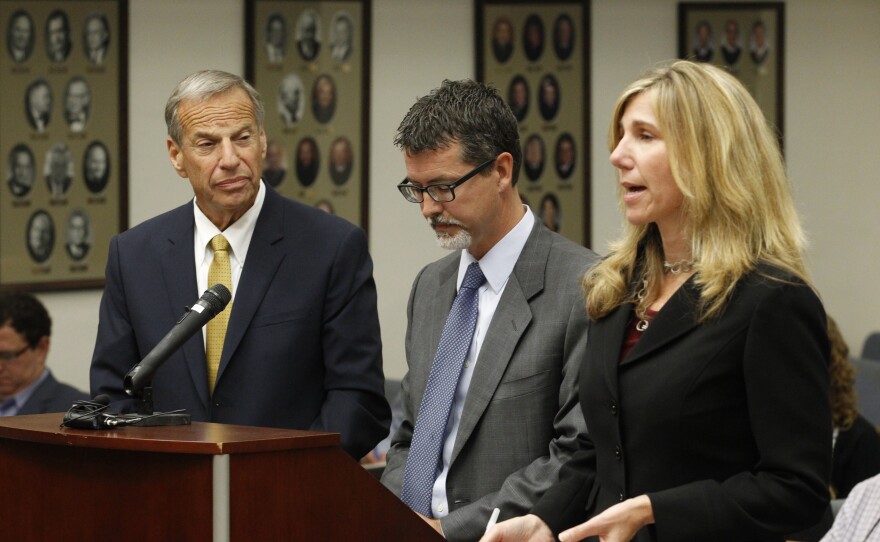On July 22, 2013, former city of San Diego Communications Director Irene McCormack Jackson dropped a bombshell in front of a bank of television cameras.
She revealed that for months, she had watched then-Mayor Bob Filner treat women as “sexual objects” and “stupid idiots” inside the offices of City Hall. And then she was the first to disclose she was more than a witness.
”I was placed in the Filner headlock and moved around like a sexual ragdoll while he whispered sexual comments in my ear,” said Jackson, who later settled a sexual harassment lawsuit against the city for $250,000.

Jackson’s revelations were just the beginning. One by one, at least 19 women came forward over the next several weeks, alleging Filner had harassed them. Some of the allegations dated back to when he was a congressman and a San Diego city councilman before that.
But this cascade was set off by something extraordinary one week before Jackson spoke.
On July 15, 2013, allies of Filner — fellow Democrats who were deeply invested in his agenda for the city — organized a press conference. Former San Diego City Councilwoman Donna Frye, along with lawyers Cory Briggs and Marco Gonzalez, called on the mayor to resign.
“We want the women of this city and the people who love them to know that sexual abuse is not normal,” Frye said at a press conference. “They are not to blame. Bob Filner is to blame.”
Five weeks later, on Aug. 23, 2013, Filner announced his resignation. But he did so defiantly, telling the San Diego City Council there was no proof of his alleged actions and accusing those calling for his ouster of being a “lynch mob.”
Yet, in October that year, he pleaded guilty to false imprisonment and battery charges involving three women. He was sentenced to three months home confinement and three years probation.
The scandal sent shockwaves through San Diego and made national headlines. Many of Filner’s accusers said they were speaking out — not just to expose Filner but to rally around one another and seek justice.
Advocates for sexual harassment survivors say that unity formed the groundwork for the #MeToo movement four years later.
“It was very important because it laid the predicate for women coming together and saying `Enough is enough, we're going to speak out about something that we may not want to talk about, something that we might find to be personally embarrassing or humiliating,’” said Julie Roginsky, a cofounder of the New York-based nonprofit Lift Our Voices that lobbies for safe workplaces.
“They showed the country well before the #MeToo movement really kicked off … that this was possible,” she said.

Famed women’s rights lawyer Gloria Allred, who represented Jackson in her lawsuit against the city, said she has long believed “courage is contagious” and the Filner case proved it.
“It certainly was contagious in San Diego,” Allred said. “In the settlement of (Jackson’s) lawsuit, the mayor agreed to resign. And I give all credit to both Irene and also to those other women who came forward and said, `I'm willing to speak out and have my voice heard.’”
Roginsky said the Filner scandal was also notable for the way his own well-known political supporters sought to publicly hold him accountable.
“You're talking about a major city,” Roginsky said. “You're talking about a mayor who was the first mayor of his party to be elected in decades. And yet, here were members of his own party calling him to account.”
But not everyone. Lawyer Briggs said many Democratic Party stalwarts chose silence.
“A lot of people turned a blind eye for a long time because at least in Bob's political world, he delivered for his allies and for his party,” Briggs said. “And whether you are an upstanding member of society is very low on the scorecard for political parties.”
But for all that has changed, a lot has also stayed the same.
Just this year, San Diego County Supervisor Nathan Fletcher, a Democrat, resigned after a San Diego Metropolitan Transit Agency staffer accused him of sexual assault.
Nationally, Allred says sexual harassment remains frequent.
“Most of the victims still are women because it's an abuse of power by those in power (against) those who are not in power,” Allred said. “And most of the people who are in power in the workplace are still men.”
Still, she said there is good news. This year, a new federal law took effect. It exempts sexual harassment from nondisclosure agreements people sign when they start a job. And when it happens, Allred says fewer people are keeping quiet.
“Many women are just not going to put up with this anymore and they are going to fight back,” Allred said.
Little is known about what Filner is doing now. In 2018, he publicly apologized again for his actions and asked for forgiveness.





